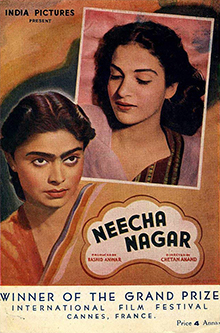Top Qs
Timeline
Chat
Perspective
Neecha Nagar
1946 film by Chetan Anand From Wikipedia, the free encyclopedia
Remove ads
Neecha Nagar (transl. Lowly City) is a 1946 Indian Hindi-language film, directed by Chetan Anand, written by Khwaja Ahmad Abbas and Hayatullah Ansari, and produced by Rashid Anwar and A. Halim. It was a pioneering effort in social realism in Indian cinema and paved the way for many such parallel cinema films by other directors, many of them also written by Khwaja Ahmad Abbas. It starred Chetan Anand's wife Uma Anand, with Rafiq Anwar, Kamini Kaushal, Murad, Rafi Peer, Hamid Butt, and Zohra Sehgal. Neecha Nagar (Lowly City) was a Hindi film adaptation in an Indian setting of Russian writer Maxim Gorky's 1902 play The Lower Depths.
Neecha Nagar became the first Indian film to gain recognition at the Cannes Film Festival, after it shared the Grand Prix du Festival International du Film (Best Film) award at the first Cannes Film Festival in 1946 with eleven of the eighteen entered feature films.[2] It is the only Indian film to be ever awarded a Palme d'Or.[3] Ironically, the film was never released in India.[4] However the film was telecasted on Doordarshan, (India's national broadcaster) in 1980s.
Remove ads
Overview
It was based on a Hindi story, Neecha Nagar, written by Hayatullah Ansari, which in turn was inspired by Gorky's The Lower Depths. It took an expressionist look at the gulf between the rich and poor in society.[5][6]
Neecha Nagar was the debut film of actress Kamini Kaushal and for Ravi Shankar as a music director.
Cast
- Rafiq Anwar as Balraj
- Uma Anand as Maya
- Kamini Kaushal as Rupa
- Murad as Hakim Yaqub Khan Sahab
- Rafi Peer as Sarkar
- S.P. Bhatia as Sagar
- Hamid Butt as Yaqoob Chacha
- Mohan Saigal as Raza
- Zohra Sehgal as Bhabi
- B. M. Vyas as Balraj's brother
Soundtrack
This section needs expansion. You can help by adding to it. (August 2021) |
The music of the film was composed by Ravi Shankar with lyrics by Mammohan Anand and Vishwamitra Adil.
- "Utho Ke Hame Waqt Ki Gardish" - chorus
- "Kab Tak Gahri Raat Rahegi" - Lakshmi Shankar
- "Birha Ki Aag" - Geeta Dutt
- "Dil Mein Samaake" - N/A
- "Ek Nirali Jyot Bujhi Hai" - N/A
- "Haiya Ho Haiya" - N/A
- "Hum Rukenge Bhi Nahi" - N/A
- "So Na O Nanhi" - Lakshmi Shankar
Awards
Citations
References
External links
Wikiwand - on
Seamless Wikipedia browsing. On steroids.
Remove ads

